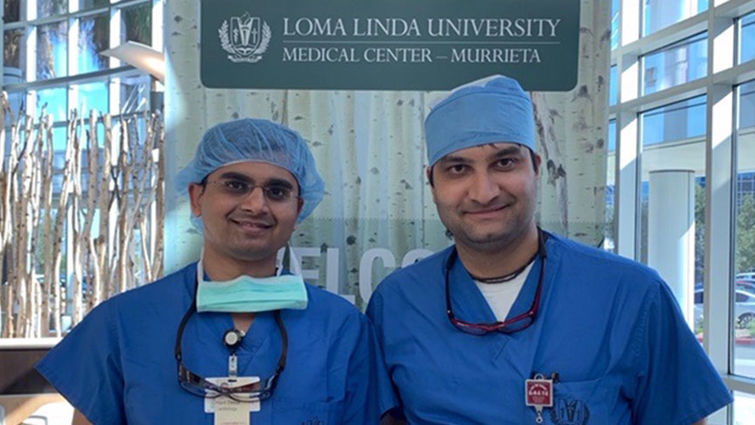
A new, less-invasive treatment to treat mitral regurgitation, called transcatheter mitral valve repair (TMVr), is now available at Loma Linda University Medical Center – Murrieta for patients who are not suited for open-heart surgery.
During the procedure, the physician accesses the heart through a vein in the patient’s leg and inserts a thin wire, called a catheter. A device called MitraClip is implanted onto the mitral valve, clipping together a small area of the valve. While the valve continues to open and close on either side of the clip, blood continues to flow on both sides, reducing backward flow.
The inaugural surgery was performed Monday, Nov.11. by Harit Desai, MD, an interventional cardiologist, and Niraj Parekh, MD, a cardiologist and director of cath lab and structural heart interventions at Loma Linda University Medical Center – Murrieta. Parekh said the cardiovascular team is proud to offer this latest breakthrough for those in the community diagnosed with mitral valve regurgitation.
“Along with offering TAVR for patients with aortic stenosis, the addition of TMVr for treatment of mitral regurgitation greatly enhances our ability to treat patients with structural heart disease,” Parekh said. “The ability to offer advanced structural heart care would not be possible without our amazing cardiovascular team.”
The heart is composed of four valves designed to prevent the backward flow of blood, all of which are essential for optimal health. The mitral and tricuspid valves control blood flow from the atria to the ventricles. If the mitral valve is damaged or becomes misaligned, it can’t close completely with each heartbeat. When the heart cannot close properly with each beat, blood moves backward with each contraction, causing backflow also called mitral regurgitation.
Patients with mitral regurgitation often suffer from breathlessness and fatigue with exertion, frequent urination, lightheadedness, swollen feet or ankles, persistent cough and heart palpitations — sensations of a rapid, fluttering heartbeat. However, patients can show no symptoms for decades and be unaware of the condition. If left unmonitored, the strain on the heart can lead to atrial fibrillation or heart failure. Parekh recommends that patients with mitral regurgitation have their condition regularly monitored by a cardiologist to assess if treatment is needed.
In July, the FDA approved the fourth generation of TMVr for treating mitral regurgitation patients. Previously, open-heart mitral valve replacement surgery was the only treatment option for severe mitral regurgitation, leaving patients not able to undergo open-heart surgery due to age, advanced heart failure or other serious conditions without an alternative option.
Parekh said having a less invasive alternative close to home is long overdue and will positively impact the patients and families in the community.
“The TMVr technology is growing as is the patients we are serving,” Parekh said. “I am excited that we offer a variety of options in advanced cardiology care to our community.”
To learn more about TMVr and heart care services at Loma Linda University Medical Center — Murrieta, visit their Heart Care website or call 951-290-4314.
